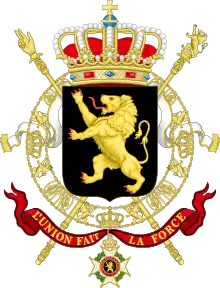| |||||||||||||||||||||||||||||||
66 of the 132 seats in the Chamber of Representatives 67 seats needed for a majority | |||||||||||||||||||||||||||||||
|---|---|---|---|---|---|---|---|---|---|---|---|---|---|---|---|---|---|---|---|---|---|---|---|---|---|---|---|---|---|---|---|
| |||||||||||||||||||||||||||||||
| |||||||||||||||||||||||||||||||
 |
|---|
|
|
Partial general elections were held in Belgium on 8 June 1880.[1][2] In the elections for the Chamber of Representatives the result was a victory for the Liberal Party, which won 74 of the 132 seats.[2] Voter turnout was 67.2%, although only 62,936 people were eligible to vote.
Under the alternating system, elections were only held in five out of the nine provinces: Antwerp, Brabant, Luxembourg, Namur and West Flanders.
A special election was held on 21 August 1880 to elect a representative for the arrondissement of Oudenaarde following the death of Auguste Devos on 21 July 1880. Florent De Bleeckere was elected to succeed him.
Results
Chamber of Representatives
 | ||||||||
|---|---|---|---|---|---|---|---|---|
| Party | Votes | % | Seats | |||||
| Won | Total | +/– | ||||||
| Liberal Party | 21,283 | 50.31 | 26 | 74 | +2 | |||
| Catholic Party | 20,700 | 48.94 | 40 | 58 | –2 | |||
| Others | 318 | 0.75 | 0 | 0 | New | |||
| Total | 42,301 | 100.00 | 66 | 132 | 0 | |||
| Total votes | 42,301 | – | ||||||
| Registered voters/turnout | 62,936 | 67.21 | ||||||
| Source: Mackie & Rose,[3] Sternberger et al. | ||||||||
References
This article is issued from Wikipedia. The text is licensed under Creative Commons - Attribution - Sharealike. Additional terms may apply for the media files.

